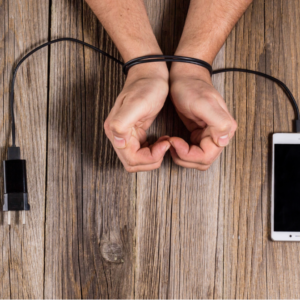Our phones are meant to be addicting to us – but how can we break away?

47% of Americans are addicted to their phones, and the average person checks their phone every 12 minutes, or approximately 80 times per day.
Picking your phone up can become a habit as data shows that half of all screen time sessions begin within 3 minutes of the last. This is a habit that can be hard to break, especially when social media algorithms are built and designed to keep us on the platform for as long as possible. This is mostly done through recommendation algorithms, which collect data on what people are watching, clicking, liking, commenting, sharing, buying, and even where they are living. All of these factors are ranked to give you the content that shows up in your feed, which in turn causes our minds to release dopamine in response to stimuli from being on our phones.
For example, when you go to post a photo on Instagram, your mind is rewarded with the likes and comments from your friends. Over time this causes our brains to associate that feeling of validation and gratification with our phones, causing us to slowly develop an addiction to social media and our phones.
“Social media addiction primarily stems from the human need for connection and validation, with platforms providing instant gratification through likes and comments. This can be especially enticing for those with low self-esteem. Ironically, this addiction often worsens feelings of isolation and inadequacy, as users find themselves in a cycle of seeking validation online, yet feeling more disconnected in reality. The constant exposure to idealized content leads to harmful comparisons, impacting real-life satisfaction, relationships, and mental well-being,” explains Alexandrea Day, CEO of the Neurotech company MetaBrain Labs.
These algorithms, plus phones being addictive in general, and low self-esteem issues create the perfect storm of people who are dependent on and addicted to their screens.
Our phones serve as a portal to connect to our social world. Nowadays, we spend most of our time on cell phones, either texting, scrolling through social media or messaging friends. Previous avenues for socializing were places, now they are online. With younger generations growing up in an increasingly digital world, it means for many the only practical options for building a community outside of school is online.
“Social media addiction particularly affects younger generations due to their ongoing identity development, making them more susceptible to the influential messaging on these platforms. To address this, it’s important to foster critical media literacy, enabling young people to discern and evaluate online content critically. Additionally, nurturing open communication and support systems can help them contextualize their online experiences. Encouraging healthy online habits, like setting boundaries for social media use and promoting offline activities, is also crucial. While delaying the onset of social media engagement can be beneficial, equipping young people with the necessary tools and skills for responsible …read more
Source:: Social Media Explorer







